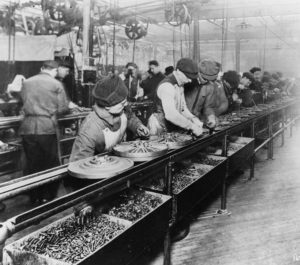Individual vs. uniform mass production (long-tail thinking)
While traditional crafts were bespoke, the industrial revolution and mass-production techniques led to the creation of large numbers of identical products. In contrast, websites and mobile apps are often heavily personalised. Digital technology can help make physical products like this, for example a small distillery in West Wales (inthewelshwind.co.uk) enables other small businesses to create unique hyperlocal botanical blends for their own branded gins. Industry 4.0 techniques including flexible manufacturing and digital fabrication create the potential for 21st century industry digital artisans.
- e.g. fashion, washing machine and hyperlocal distillery case studies
- enabled by communication, digital fabrication
Distributed vs. centralised
Physical transport and economies of scale have led to heavily centralised logistics. However, global communication allows local–to–local connections, such as the Freecycle Network (freecycle.org).
- e.g. washing machine case study
- enabled by communication, digital fabrication,
role of money
Open monitored processes
In industry, education and even research, we often adopt inflexible processes. In contrast, combinations of sensing technology and rapid computation can allow processes that are more open-ended, monitoring progress, tracking gaps, problems or even inconsistencies rather than forbidding them. For example, working with musicolgists, we have been seeking ways to make digital archives work more incrementally as material is available rather than waiting for the final authoritative dataset and using rich provenance to combine community-sourced and scholarly material.
- e.g. digital archives, drug testing policy
- enabled by communication, computation
Deconstructing knowledge, behaviour and experience
Just-in-time knowledge and remote collaboration can break down traditional professional barriers, for example, enabling paramedics to perform medical tasks in the field.
- e.g. health – just in time knowledge for paramedics
- enabled by communication, computation
Physical–digital ecologies
In a traditional workshop there would be a specialised tool for each task, in contrast 20th century user interfaces were about the single device doing everything. Point-to-point and cloud communication means we can now thing about rich ecologies where different devices and technologies interact, for example combining physical books and digital devices.
- e.g. mobile learning, books

